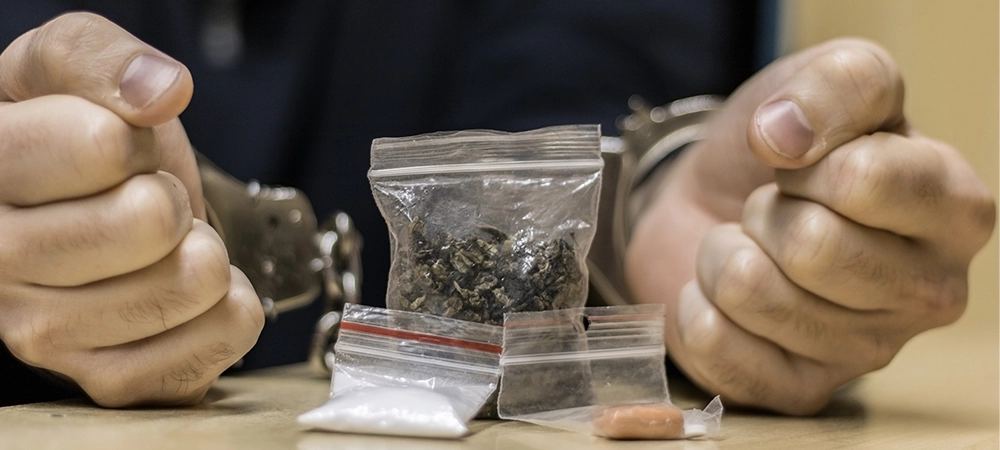While all drug offences are taken seriously under Canadian law, possession with intent is one of the most serious accusations. The penalties for this criminal offence range from several months and a monetary fine to life imprisonment.
As you’ll learn here, the sentence varies based on the type of drugs and quantities in question. It can also depend on whether the Crown can prove its case in the entirety and whether you have a valid defence against the charges. Let’s take a look in more detail.
Types of Possessions
Based on the Criminal Code of Canada, three types of possession charges:
Actual Personal Possession – When the drugs are found on the accused.
Joint Possession – When the drugs aren’t found on the accused and instead with another person, but everyone knows and consents to their possession of them.
Constructive Possession – When the drugs aren’t found on the accused but with another person with the accused’s knowledge and benefit.
The role of intent plays a crucial role in all three types, however, it must be proven. Likewise, the Crown must prove beyond reasonable doubt that the accused was in possession and control of an illegal substance, that their possession was not authorized, and that the accused had the intention of trafficking, selling, or distributing the drugs in their possession.
The last point is particularly crucial when considering the legal ramifications as it must be proven that the accused had the intent to traffic as opposed to use the drugs personally.
Intent can be proven in one of these ways:
- Finding large amounts of illegal substances (inconsistent with personal use).
- The drugs are worth a considerable amount of money.
- Being found packaged in a way that indicates trafficking (for example in small plastic bags).
- The drugs are high quality.
- Found alongside tools that are used for trafficking and/or large amounts of money.
Legal Consequences of Drug Possession or Trafficking Offences
Penalties for drug offences with intent in Ottawa vary based on several factors. These include:
- Whether minors were involved
- Whether it was the accused first offence
- Whether the crime is a summary, indictable, or hybrid offence
- Whether the trafficking was conducted near an area frequented by minors or a prison.
Related Article: https://www.agpllp.ca/insights/the-different-types-of-criminal-charges-in-ottawa/
Based on the Criminal Code of Canada, the following penalties apply for indictable drug offences with intent:
- For intent to traffic Schedule I drugs, the sentence can go up to life in prison.
- For intent to traffic (being in possession of over 3 kg is considered trafficking in this case) Schedule II drugs, the maximum penalty is life in prison, while less than 3kg carries up to five years in prison.
- For intent to traffic Schedule III drugs, the penalty is 10 years imprisonment.
- For intent to traffic Schedule IV drugs, the maximum sentence is 3 years in prison.
Related Article: https://www.agpllp.ca/insights/what-to-do-if-you-are-arrested-in-ottawa/

Defences to Drug Possession with Trafficking Intent
With the help of a qualified attorney, you might be able to find a possible defence to possession with intent charges. Below are some common defence tactics used in Ottawa.
Insufficient Possession and Trafficking
The first line of defence is insufficient possession, which may entail proving either:
- Arguing the accused had no intent to interact with illegal substances and came to possession unknowingly (no mental intent).
- The amounts of the drug don’t indicate that the accused was using, much less have the intent to traffic the substance.
- The accused took possession of the drugs with the intent of handing them over to the authorities or destroying them rather than trafficking them (innocent possession).
Additionally, the defence can argue that the Crown’s prosecutor can only offer circumstantial evidence that the accused intended to traffic the drug. For example, if there was no money and other paraprofessionals found alongside the drugs. Or, the defence might claim that the accused role was to introduce the buyer to the seller, but they themselves haven’t participated in the transaction.
Entrapment
If the police or undercover agents find evidence of the accused’s intent for trafficking, the defence may argue that the authorities have no reason to suspect that the accused was involved in the crime beforehand and that the charges against them are a result of entrapment.
Violation of Constitutional Rights
The Charter of Rights and Freedoms gives certain legal rights to all Canadian citizens and if the defence team can establish that these rights were violated during the search of property and arrest, they may argue for dismissing the charges altogether.
Related Article: https://www.agpllp.ca/insights/how-to-choose-a-criminal-defence-lawyer-in-ottawa/
Final Thoughts
The legal ramification of drug offences in Ottawa depends on whether intent for trafficking is established. However, this charge can be difficult to prove even if drugs are found in the accused’s possession. The prosecution must establish that the person not only knew they had drugs in their possession but also that the drugs were not for personal use only.
The penalties and the possible defences for possession with intent depend on several factors, so if you find yourself in this situation, make sure you find a reputable criminal offence lawyer before you face a criminal trial. If you need legal representation, then make sure to give AGP LLP a call today. We’ll be happy to look at your case and advise on the next steps.





